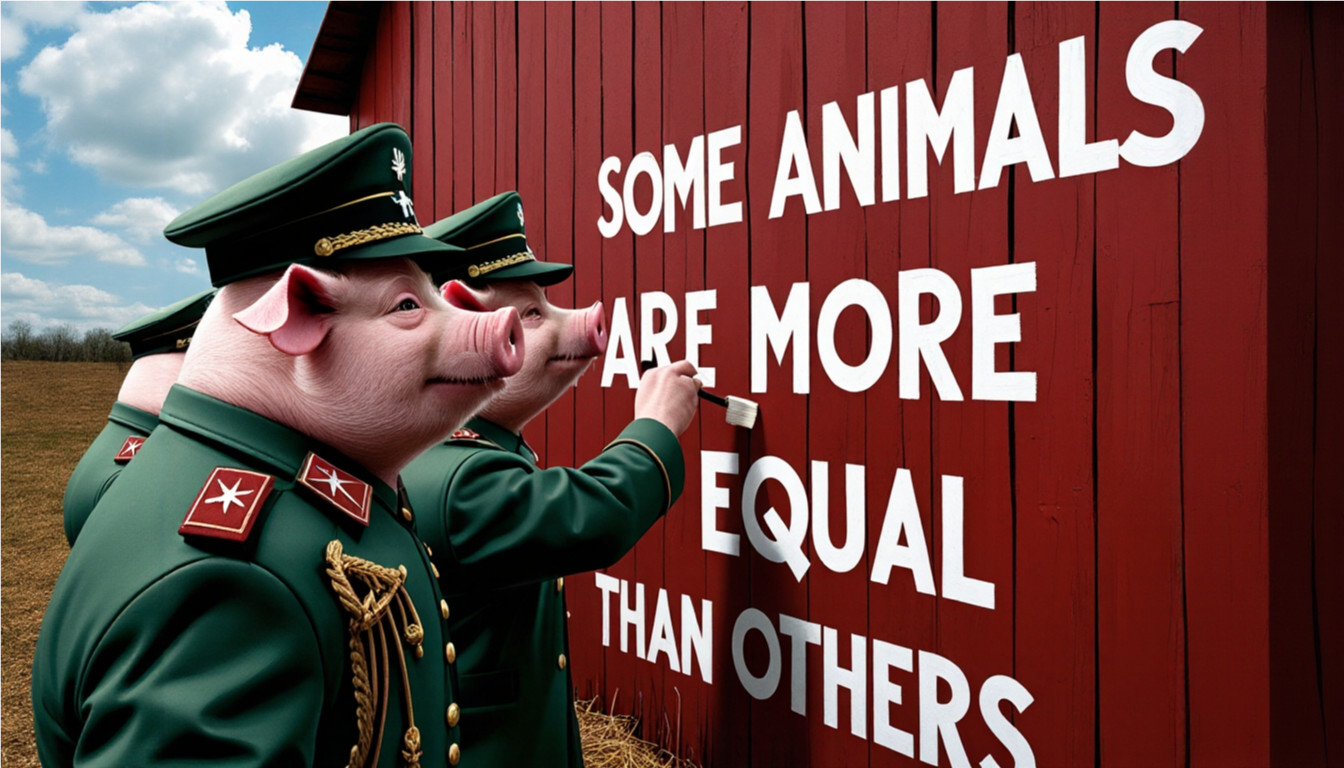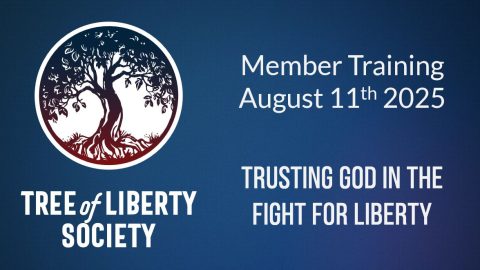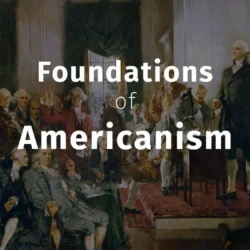Are you free to associate with whomever you choose without the government getting involved? Should the government force others to associate with you? Should they force you to associate with others?
This is an excerpt from “Discrimination Is Actually Good,” which you can watch in full, for FREE, here: https://treeoflibertysociety.com/how-dilbert-taught-us-discrimination-is-good/
Help support ad-free content with a one time donation or becoming a member today.
Thank you to our sponsors
https://connollyandsonsconcrete.com/
https://www.dentistry4health.org
http://www.highercallingfirearms.com
http://www.americanappliancehvac.com
https://insurewithcompass.com/sbarlow.html
TRANSCRIPT
Certainly! Here’s your original text formatted into proper sentences and paragraphs without changing any of the wording:
One of the things that they bring up about discrimination is not making cakes for homosexuals, for sodomites. And it’s about more than just a cake, okay? They’re using government to force people to associate with each other.
The government puts up these signs to help people to reach out and make sure that if somebody doesn’t wanna associate with you, that now you go to the government to force them to associate with you. We have here CNN reporting back in 2018 about the gay wedding cake, ruling affirms that businesses can’t discriminate. So they’re saying that you as a business owner are essentially enslaved to anyone that wants to go into your store and request your services. You have to associate with them.
And then we have here recently where We’re just actually not recently, but a few years ago, this started back in 2009 when Salt Lake City passed its first bill forcing homeowners and business owners to associate with people they might not want to associate with. They might have to rent a home to a group of sodomites or transgendered people, and they might not want to or they might have to hire them, right? If you’re in a professional atmosphere, say you own a private school and it’s somebody that it’s a maybe even a religious school that might not be owned by a religion, but it’s based, you know, there are people of one religion have come together in common to be able to have their children educated with people of the same mindset. And now because you own this business, the school, the state of Utah and many other states have said that no, you have to hire someone’s a sadamite or a tranny to teach these children in this religious oriented school.
And so they started to take away your rights as a property owner and your rights of association, forcing you to associate people with maybe you don’t want to. It’s more than just a cake. We have the New York Times talking about this as well talking about there’s another law from Colorado going or the Supreme Court. And the points that it makes, I think is very interesting for us to pay attention to.
It says, can an artist be compelled to create a website for an event she does not condone? That’s the question the Supreme Court has said it will take up on Monday when it hears oral arguments on 303, creative versus alinas. The answer would seem to be obviously no.
So they’re reasonable right here, at least they’re pretending to be reasonable, saying, of course, an artist can’t be compelled to create something for somebody else. But it goes on and says, well, that’s the wrong question. The right question. This is what they do. They want to reframe the debate so that they can control it.
The right question is whether someone who chooses to open a business to the public should have the right to turn away gay customers simply because the service she would provide them is expressive or artistic? Should an architecture firm that believes black, black families don’t deserve fancy homes be permitted to turn away black clients because its work is expressive? Can a florist shop whose owner objects to Christianity refuse to serve Christians? The answer to these questions would seem to be just as obviously known.
I say that that’s not obvious. That is just the opposite of obvious. Of course, Each one of those should have the right to associate with whomever they want to and not to associate with whomever they don’t want to.
So why is the first question that continues the wrong one in this dispute? The case before the court was brought by 303 Creative, a business that says it wants to offer wedding website design services to the public but doesn’t want to serve gay couples. Under Colorado’s public Accommodations law, businesses that choose to serve the public at large cannot turn people away because of their race, sex, religion, sexual orientation, or other protected characteristics.
So the government has to, this is what it’s does. The government is creating a class of person that is protected that is now becomes a superior. So this isn’t about equality. This is about superiority that they are now you can, if you’re a member of this group, now you can force others to do labor for you.
303 creative claims that because its service is expressive and its owner objects to same -sex marriage, it can’t be required to obey Colorado’s law. Not to afford an exemption, the company argues, compels it to speak against its will, and violates its free speech rights, which is obvious.
It’s forcing them to do something to express something to say something that they don’t agree with so clearly is a violation of their free speech rights the government is prohibited from controlling your speech, but here they want to they’re saying if you decide to go out in public right they’re saying if you are in your home privately, then you can believe and do whatever you want. But as soon as you step out that door to the public, then you no longer have rights.
That is say, okay, now I’m open to the public. Now there is a group of people that the government can add to or take away from a list of people that are superior and can force me to work for them. The article continues, but we filed an amicus brief supporting Colorado’s in 303 initiative And we defended the same law five years ago on behalf of the gay couple denied service by Masterpiece Cake Shop.
We did so because Colorado’s law does not, this is talking about the lawyer defending the company’s ability for free speech, not to do what 303 Creative claims it does. Public accommodations laws, which have been on the book since the 19th century, ensure that everyone has equal access to the public marketplace without regard to attributes historically marking them for second class status.
So instead of, it does the exact opposite. This is classic Orwellian where they’re saying that it protects you from being in second class status when what it actually does is it elevates you as a superior class that can force others to work for you or to house you, whatever the case may be.
Those laws don’t trigger serious First Amendment concerns because they treat all businesses equally. So as long as they oppress everybody, it’s okay. Whether they take corporate headshots or serve burgers and fries.
The purpose of these laws is not to dictate the contents of anyone’s speech, but to make sure that nobody is denied goods or services in commercial markets for discriminatory reasons. Some animals are more equal than others.
They’re open to the public. So according to this, because they’re open to the public, they can’t turn you away. But here we have this article from Fox 13, it says, no mask, no service can businesses legally require customers to wear masks. Okay.
When people are out there saying this is an infringement upon my first amendment rights, a Fox reporter began to ask, that’s just wrong, answered David Raymond, a local first amendment attorney with par gown, Guy and loveless. You can set the terms of what happens in your business. and there’s no requirement that you allow people to come into your business, for instance, with a gun or without a face mask or something like that.
Raymond continued, “If you want to set those terms, it’s your business, your private business, you’re entitled to do that.” The short answer is yes, a business can refuse a customer service for not wearing a mask. It is not considered a form of discrimination.
Why is it not considered a form of discrimination? Because those people were not added as a special class. Therefore, some animals are more equal than others because you weren’t listed by the government through legislation. You have less rights than those that are put on that list.
And so what they’re, what they’re claiming to do of making preventing second class citizens is what they’re actually doing. They’re creating second class citizens by saying if you’re not on this list, then you don’t get the same protections as the other individuals.
Now, some would say, well, then what we should do is pass a law that says that you have to serve everyone, no matter what. I would disagree with that. With the exception of conspirator businesses, which we have covered in the past, like going back to the example of the Boston Tea Party and the founding fathers going after that private ship and that private ship’s tea and destroying it, it was because they were part of the conspiracy. And so the people had the obligation to fight that conspiracy and destroy that person’s property because they were working in conjunction.
But with this is all things being equal, each business has the right. If you want to not serve black people, if you want to not serve white people, if you want to only serve people carrying guns, whatever it is that you want to associate with, that is your right as an individual, whether you open a business or with your private person in your home.
And they weren’t required to do business by trade route of the ports of England. So they basically were able to, by the enforcement of the government, outperform all their competition. So they were destroying. So it’s not, yeah.
So it kind of looks like discrimination. And then you can say the same thing with like Harman’s. They’re not discriminating when they’re saying you can’t come in with a mask. They’re destroying freedom, both culturally and your ability to be able to feed yourself. And so what’s what’s going on here?
So it’s not really about protecting people from discrimination, because that’s really what it was. They would be consistent, but they’re not. What is it about these protected classes? They’re destroying the moral fabric of society by saying that you have to promote gays.
That’s a part of it, definitely. But it’s more than just the sodomites that they’re promoting. Yeah, of course. There are key parts of this woke agenda as it’s referred to today that that’s beyond just the sodomites, but that’s a key part of it for sure is the moral fabric for sure because they’re not about protecting, you know, people against discrimination.
There’s a bigger and larger agenda at play than what they want you to focus on what they want you to focus on is discrimination. So that way you’re on the defense, which is what we should never be on. and you’re like, oh, I’m not a racist. Oh, I’m not a homophobe.
And that’s very Orwellian as well, transphobe, homophobe, all of these different phobe words. Phobic means fear. And so what they’re trying to do is put in there that you’re afraid. And so you’re acting out of fear, which is not the case at all. There’s no fear of these individuals.
There is a understanding of what happens when they infiltrate a society and where they come from and what it does when they take over society.
Let me know if you’d like a version formatted as a formal essay or adapted for presentation.









